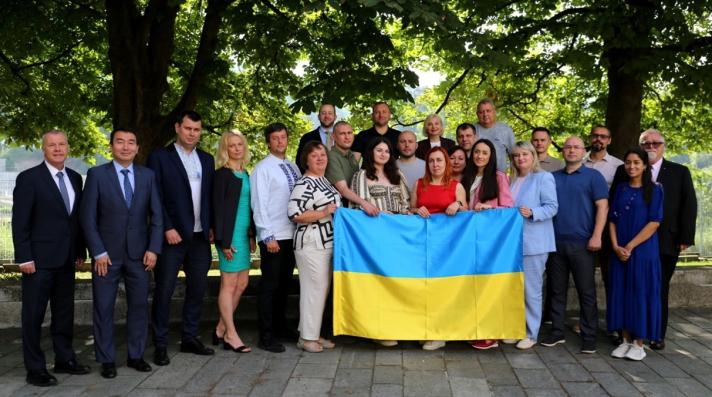
As Ukraine faces complex security challenges amid ongoing conflict and external aggression, the risk of incidents involving chemical, biological, radiological, and nuclear (CBRN) materials has intensified. Accidental releases, sabotage, or the intentional use of hazardous substances require not only a swift operational response but also a robust legal framework to ensure accountability.
To address these challenges, the European Union is supporting Ukraine in strengthening the legal, forensic, and institutional capabilities necessary to investigate and prosecute CBRN-related crimes effectively. This support comes through the innovative “From CBRN Crime Scene to Courtroom” project, implemented under the EU CBRN Risk Mitigation Centres of Excellence
Ukraine takes the lead in capacity building
From 23 to 25 June 2025, sixteen Ukrainian professionals were certified as national trainers during a Train-the-Trainer (TTT) course held at the United Nations Interregional Crime and Justice Research Institute (UNICRI) in Turin, Italy. The training combined two days of theoretical sessions with one day of peer-led practical instruction, focusing on adult learning principles, dynamic teaching methods, visual communication, and effective classroom presence.
This marked the final step in Ukraine’s full participation in the six-month integrated training programme. The certified trainers are now equipped to deliver and adapt the material nationally, ensuring that the knowledge becomes embedded in Ukraine’s legal and law enforcement training systems.
A structured approach: from incident to prosecution
The “From CBRN Crime Scene to Courtroom” initiative provides a comprehensive, scenario-based training programme that brings together prosecutors, investigators, forensic specialists, and legal experts into a unified response framework. Its five interlinked modules include:
- Tabletop Exercise: Strategic coordination and identification of operational gaps.
- CBRN Criminalisation Workshop: Analysis of international legal frameworks and national implementation.
- Building a Case for Prosecution: Converting technical findings into court-admissible evidence.
- Mock Trial / Moot Court: Practical experience using adapted legal procedures.
- Train-the-Trainer (TTT): Sustainability through national instructor certification.
Ukraine played a central role in the project’s pilot phase, working closely with Moldova to test and refine the methodology. With the final module now completed, Ukraine is ready to deliver the training independently, tailored to its own institutional needs and legal context.
Institutionalising CBRN legal training in Ukraine
A major strength of the programme lies in its long-term vision. From the outset, Ukraine’s legal and judicial training institutions were involved to ensure ownership and continuity. Over 30 tailored training modules are already being integrated into national educational programmes, laying the groundwork for sustained expertise in managing and prosecuting CBRN incidents.
Between 2025 and 2027, Ukraine will roll out advanced training sessions across the country, targeting prosecutors, judges, investigators, and law enforcement professionals. These sessions aim to build a more coordinated and effective national response to high-risk CBRN threats.
A strategic investment in justice and security
The EU’s support through this programme comes at a critical moment. Strengthening the justice system’s ability to respond to CBRN crimes enhances public safety, supports the rule of law, and reinforces national resilience in the face of wartime risks. By bridging the gap between forensic science and legal prosecution, “From CBRN Crime Scene to Courtroom” establishes a sustainable, expert-driven model that can be replicated across regions.
This initiative reflects the EU’s continued commitment to strengthening Ukraine’s institutional capacity and security infrastructure in the face of evolving threats.
To learn more about the EU CBRN CoE support to CBRN risk mitigation in South East and Eastern Europe, visit the Regional Secretariat page
Details
- Publication date
- 27 June 2025
- Authors
- Service for Foreign Policy Instruments | Joint Research Centre
- CBRN areas
- Investigation and prosecution
- Legal framework
- Post incident recovery
- Public health impact mitigation
- Safety and security
- CBRN categories
- Chemical
- Biological
- Radiological
- Nuclear
- CoE Region
- SEEE - South East and Eastern Europe

